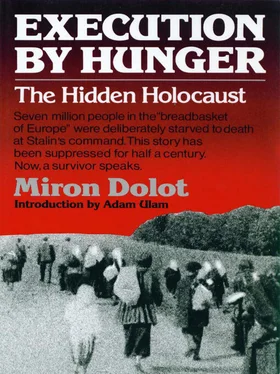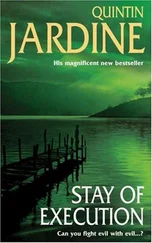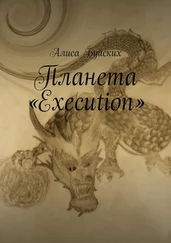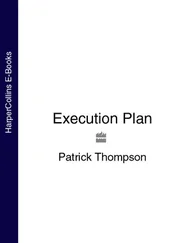But, for the most part, these dreams were never realized. The crowds in and around the railroad stations would be rounded up periodically by the militia and GPU men, loaded onto trucks like stray animals, and dumped somewhere outside the town limits.
We had better luck in obtaining train tickets because we were going south, not north. Soon we were on our way home, but the horror pictures of starvation were not over.
There were very few people in the car we entered as there wasn’t much traffic to the south—to the interior of Ukraine. There were many vacant places, and soon after we occupied our seats, a woman entered our compartment followed by two small emaciated boys. What a pitiful sight they were! Their faces were skin and bones; their eyes were bulging, dull, and listless. They were unkempt; their clothes were ragged and dirty.
After they sat down, I noticed that the woman held a baby under her coat at her bosom, and that the baby was dead.
“It’s a girl,” she said quietly, without showing any emotion. “She died yesterday. My poor baby; she was hungry, and kept crying…and then suddenly she stopped…. We stayed overnight outside. They threw us out of the waiting hall. It was very cold. The boys huddled under my coat like chicks under their mother hen….”
We didn’t know what to say and just kept watching her silently and with sympathy.
She put her dead baby on her knees and started to unwrap the dirty rags in which it was bundled. Then, as if realizing that the baby was dead, she bundled it up again, held it tightly to herself, and pressed her cheeks affectionately against the baby’s cold and rigid face. She started crying and talking to her dead baby:
“I am sorry…” she sobbed, tears rolling down her face and dropping onto the baby, “It’s not my fault. Heavens, I tried; I did all I could…. They labeled me an enemy of the people…. They threw us out wherever we went.” Then she started kissing her baby tenderly, its eyes, its forehead, its cheeks.
“Don’t worry, my baby, you won’t be alone for long; soon we’ll follow you; soon you will be again with your Mama and your brothers….”
Mother could not listen to her lament any longer, and afraid of bursting out crying in front of her, she got up and started towards the door, motioning me to follow her. Once in the corridor, she gave vent to her emotions. Crying, she asked me to cut three pieces of bread and give it to the woman and her boys. We returned to the compartment and I handed the bread to them. Words cannot describe the sensation the sight of bread made for these starved human beings.
After eating half of her portion of bread, and saving the rest for her boys, the woman calmed down somewhat and was able to tell us her sad story more coherently. It was a typical story of other Ukrainian families of that time, but incomprehensible to those who did not live through those experiences of suffering and tragedy.
A year before, we learned, this woman’s husband was labeled a kurkul and “an enemy of the people,” and was banished somewhere to the north. She never heard from him again. He never saw his baby daughter who was born after his banishment and was now lying dead in her arms. She had worked hard on the collective farm, but received only a few pounds of grain and some vegetables which amounted to practically nothing and were gone by the time winter had set in. Hungry and cold, with no prospect of getting food and firewood, she heard somewhere that there was no famine in Russia.
She had a little money, so she decided to try to go north to Russia with her children. In spite of hardships, she finally reached the railroad station and for two days tried to buy a ticket to a city in Russia where some of her neighbors had gone. They actually had written to her that there was no famine there, proving that hearsay was true. However, she was unable to buy a ticket since she did not have the necessary certificate from the collective farm. Now, since her infant daughter had died, she decided to go to another city not far from her village. She had heard that some kind of a children’s shelter was located there; perhaps she would be able to leave her boys there. What would happen to her after that did not matter. She was only concerned about her two boys’ survival.
I went out into the train corridor and stood there a while looking out the window. The train rolled on the tracks with its rhythmic motion. Snow-covered fields, trees, and telegraph poles rushed by. But even here, the otherwise peaceful scenery was disturbed: all along the tracks, groups of starving people were standing, sitting, or lying. They had trudged a long way to the railroad tracks hoping for a miracle; maybe someone would throw them a piece of bread. I could not hear their voices, but I saw their outstretched hands. Some stood there holding their children. They would lift them up so people could see their famished little bodies as if crying: “A crumb of bread, please! It’s not for me; it’s for my child!”
I suddenly reached for my sack and grabbed the rest of our loaf of bread. Ahead, I noticed a woman with two small children. They needed a miracle, I thought. I opened the window, and as the train approached them, I threw the bread in their direction. I could not see what happened to it as tears were blurring my vision.
Soon we arrived at our station. Before taking the road home, I wanted to find some kind of a stick for Mother as she thought it would be easier for her to walk with it. While looking for something suitable, I strayed behind some auxiliary buildings adjacent to the railroad station. The scene I saw there has been haunting me ever since. Now, after fifty years have passed by since that moment, I can still feel the terror that seized me when I came face to face with that ghastly view. In front of me, in open view, was a heap of frozen human corpses like some discarded woodpile. Some of the bodies were completely naked; others were half-clothed; still others were fully clothed but barefoot. Their frozen arms and legs were sticking out from under the snow like tree limbs in an intricate configuration. I stood there aghast, unable to move from fright and horror. For quite a while I stared at those human bodies, with outstretched frozen arms, as if they still were begging for food and mercy. Then I ran back to my mother, with her walking stick, trembling all over, but consoled by her company.
By the time we finally reached our house, it was dark; however, our shopping adventure had not yet ended.
On the way home, Mother seemed troubled and uneasy. When I asked her what was bothering her, she confided in me. Her anxieties centered about the form we had had to fill out when we traded the medallion at the Torgsin and I understood the danger we were in.
The decree to turn in any coins and foreign currency was ignored by the villagers, resulting in many arrests and tortures by the GPU. We had not violated the decree with the medallion as it did not fall into the category of valuables. But we had made the mistake of entering the medallion as “a coin” on the official appraisal form. This “minor” mistake could now turn out to be a “major crime” against the state.
Our apprehensions soon became a reality. One afternoon shortly after our shopping adventure, a large group of government officials made a visit to our home. It was composed of familiar members of the Hundred’s Bread Procurement Commission, accompanied this time by an armed militiaman, and the chairman of the village soviet. The militiaman was a stranger, apparently especially sent to our village by the county government. This man, and the presence of so many officials, indicated to us the seriousness of our situation.
After the group entered our home, the chairman of the village soviet stepped out in front. He looked at a document in his hand, and read aloud the name of my mother for identification, even though he knew my mother very well. Then he declared that, according to “reliable sources,” we possessed gold which was supposed to have been delivered to the state treasury long ago. He informed us that the militiaman was sent to us with the order to take our gold to the county center. He also added that if we handed the gold to him voluntarily, the whole case would be closed and forgotten. Our failure to cooperate would result in the arrest of the head of the household as “an enemy of the people.”
Читать дальше












